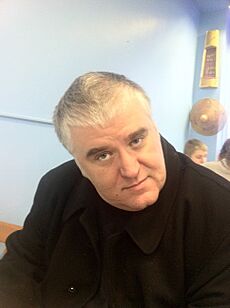Joey Manley facts for kids
Quick facts for kids Joey Manley |
|
|---|---|

Manley in 2009
|
|
| Born | Joseph Manley July 1965 Russellville, Alabama |
| Died | November 7, 2013 (aged 48) Louisville, Kentucky |
| Nationality | American |
| Area(s) | publisher; writer |
|
Notable works
|
Modern Tales The Death of Donna-May Dean |
| http://www.JoeyManley.com | |
Joey Manley (July 1965 – November 7, 2013) was an American author, web designer, and webcomics publisher. Webcomics are comics that are published online. Manley wrote a popular novel called The Death of Donna-May Dean in 1992.
In 2000, he moved to San Francisco to work in web design, which is about creating and managing websites. Manley was the founder and publisher of the Modern Tales family of webcomics websites. These included Modern Tales, Serializer, Girlamatic, and Webcomics Nation. He is known as one of the "founding pioneers" of the webcomic world. He created a new way for people to pay for webcomics, called a subscription model. This meant people paid a small fee to read comics online.
Manley was well-liked in the webcomic community. He made many connections with webcomic creators and helped bring them together. In the early 2010s, he started writing again. He shared his novel Snake-Boy Loves Sky Prince: a Superhero Teen Romance online. Manley passed away from pneumonia in November 2013 when he was 48 years old.
Contents
Early Life and First Book
Joey Manley was born in Russellville, Alabama in 1965. When he was a child, he drew comics, but he never wanted to be a cartoonist himself.
Manley's first novel, The Death of Donna-May Dean, was published in 1992. The book tells the story of a young man growing up in Alabama. It quickly became a popular book. At 27 years old, Manley felt a lot of pressure to write a second novel after his first one was so successful.
Instead, he started working in the new field of web design. In 2000, Manley moved to San Francisco. There, he worked for Streaming Media. He also became the first webmaster for Free Speech TV, which meant he managed their website. The website he oversaw, freespeech.org, won a Webby Award and a Streamers Award.
Work in Webcomics
To learn more about webcomics, Manley started a podcast called Digital Comics Talk in 2001. He also launched a review website called Talk About Comics. Through his podcast, Manley met many important webcartoonists of that time.
Manley soon began asking artists to join a new project. It was a group of webcomics that people would pay to read. He launched this project in March 2002 as Modern Tales. Manley hoped that this payment model would help all the webcomics get noticed. Even if each comic was only interesting to a small group, they would be more visible together.
Modern Tales did not make enough money for the artists to live on, but it did well. It even got attention from famous comic book artists like Harvey Pekar and Will Eisner. By 2005, Modern Tales had about 2,000 members. Each member paid $3 USD every month. Manley moved to Louisville, Kentucky around this time to save money.
Growing the Webcomics Family
Manley started several other webcomic sites that used the subscription model in the early 2000s.
- Serializer featured unique, artistic webcomics. It was edited by Tom Hart.
- Girlamatic featured webcomics mostly for female readers. It was edited by Lea Hernandez.
- Graphic Smash featured action webcomics.
Manley also published single webcomic sites where you could subscribe to just one comic. Examples include Hernandez' Rumble Girls and James Kochalka's American Elf. In 2003, Manley started co-hosting a podcast with Lea Hernandez called The Diva Lea Show.
In 2005, Manley launched Webcomics Nation. This was a service that helped webcomic creators host their comics online. All his webcomic sites were known as the "Modern Tales family" of websites. They featured artists like Gene Luen Yang, Howard Cruse, Chris Onstad, Shaenon Garrity, and Dylan Meconis.
Later Projects and Writing
In 2007, Manley worked with Josh Roberts to create ComicSpace. This was a social media and publishing platform for comics. ComicSpace received money from Michael Angst and Alan Gershenfeld. Webcomics Nation, Talk About Comics, and OnlineComics.net were all combined into ComicSpace.
Manley said in 2007 that his subscription services would mostly stay the same. However, he was moving away from the subscription model. This was because online advertising and selling merchandise were becoming better ways to make money. Even so, the Modern Tales family of websites became less active in the late 2000s.
Manley started relaunching his subscription services within ComicSpace in 2009, beginning with Girlamatic. He moved to New York City to work on this project and was very excited about it. However, ComicSpace never became as popular as he hoped.
While still working on ComicSpace, Manley moved back to Louisville. He then focused on his own creative writing. In 2011, Manley began sharing a second novel online as he was writing it. The book was called Snake-Boy Loves Sky Prince: a Superhero Teen Romance. It tells the story of a supervillain's helper who falls in love with a superhero's son. All of Manley's remaining webcomic services closed down in April 2013.
Manley's Ideas About Webcomics
In a 2006 interview, Joey Manley said he didn't think there was one perfect way to make money from webcomics. He chose the subscription model for his early projects because online advertising didn't pay much, and bandwidth (the amount of data that can be sent) was very expensive.
Manley often had to explain why he used the subscription model. Some groups didn't like it, and he became known as "the subscriptions guy." But as advertising money increased, Manley started using that model more. Manley also mentioned that he would have liked to publish comics in print, but it was too expensive. He once said, "You'll lose a lot less money publishing on the Web than publishing a printed comic."
In the same interview, Manley talked about what webcomics are and what they might become. He said that reading a comic book and reading a webcomic are similar, but people expect different things from them. He explained that "sequential art on the screen serves a different purpose." He compared it to how television was once seen as more temporary than movies. Manley believed that "Webcomics aren't a replacement for what already exists, in the same way that television didn't destroy movies."
Death and Legacy
On November 7, 2013, Joey Manley passed away from problems caused by pneumonia. He was in a hospital in Louisville, Kentucky, and was 48 years old. His spouse, Joe Botts, survived him.
Manley was given the title of Kentucky Colonel for his business efforts and for supporting free speech. He was listed by Comixpedia as one of the most important people in webcomics from 2004 to 2006. Josh Roberts said that Manley was very good at talking to people and made many connections in the field.
Many people, including Scott McCloud, Lea Hernandez, and Joshua Hale Fialkov, remembered Manley after he died. Chris Butcher, a retailer and event organizer, called Manley "a true pioneer of webcomics." Cartoonist T Campbell praised Manley for changing how webcomics made money and for bringing creators together when advertising rates were very low.


